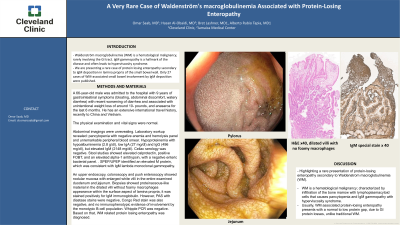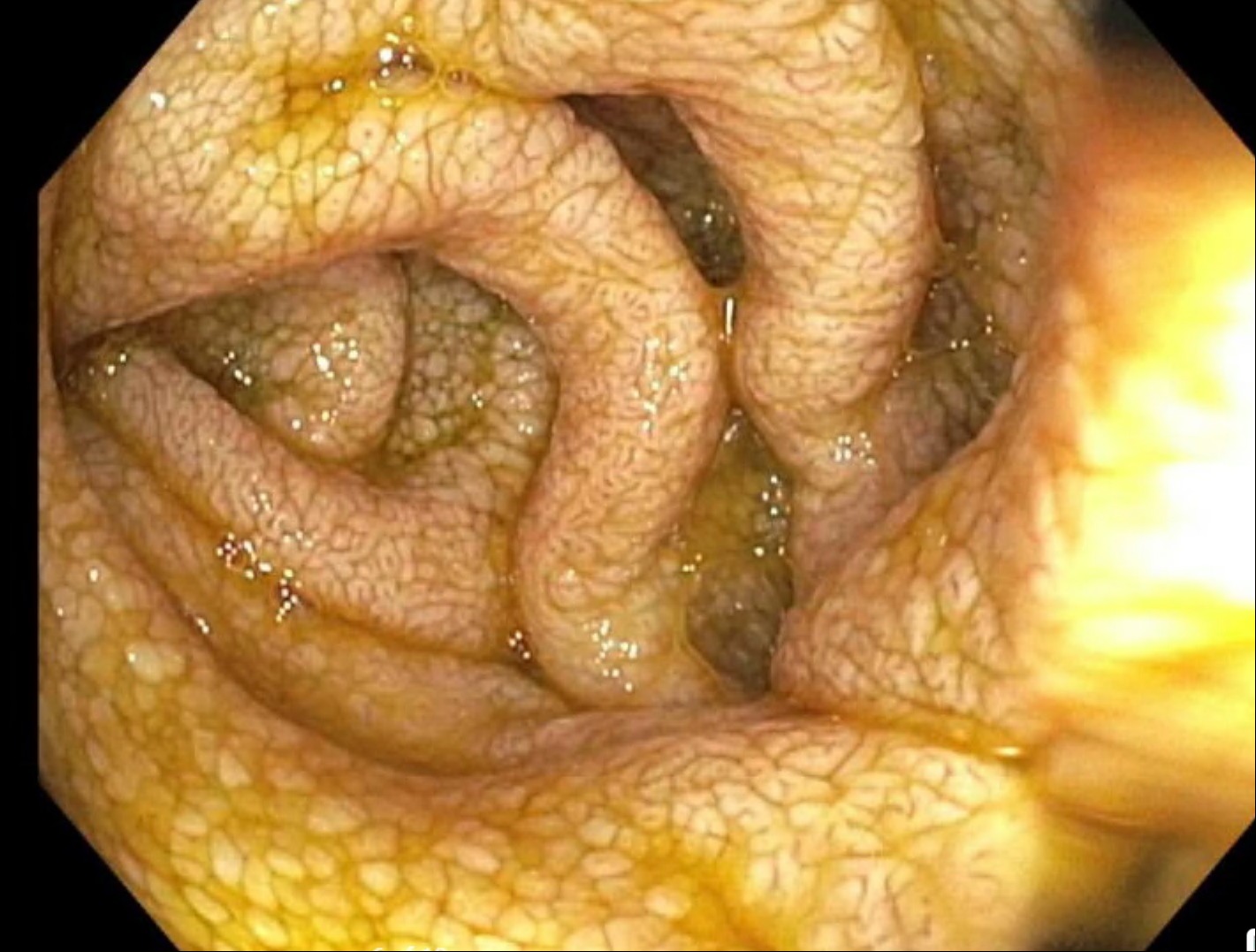Monday Poster Session
Category: Small Intestine
P3304 - A Very Rare Case of Waldenström's Macroglobulinemia Associated with Protein-Losing Enteropathy
Monday, October 28, 2024
10:30 AM - 4:00 PM ET
Location: Exhibit Hall E

Has Audio

Omar Saab, MD
Cleveland Clinic Foundation
Westlake, OH
Presenting Author(s)
Omar Saab, MD1, Hasan Al-Obaidi, MD2, Bret Lashner, MD3, Sebouh Setrakian, MD3, Alberto Rubio Tapia, MD3
1Cleveland Clinic Foundation, Westlake, OH; 2Jamaica Hospital Medical Center, Briarwood, NY; 3Cleveland Clinic Foundation, Cleveland, OH
Introduction: Waldenström macroglobulinemia (WM) is a hematological malignancy, rarely involving the GI tract. IgM gammopathy is a hallmark of the disease and often leads to hyperviscosity syndrome. We are presenting a rare case of protein losing enteropathy secondary to IgM deposition in lamina propria of the small bowel wall. Only 27 cases of WM-associated small bowel involvement by IgM deposition were published.
Case Description/Methods: A 66-year-old male was admitted to the hospital with 9 years of gastrointestinal symptoms (bloating, abdominal discomfort, watery diarrhea) with recent worsening of diarrhea and associated with unintentional weight loss of around 10- pounds, and anasarca for the last 6 months. He has an extensive international travel history, recently to China and Vietnam.
The physical examination and vital signs were normal.
Abdominal imagings were unrevealing. Laboratory workup revealed: pancytopenia with negative anemia and hemolysis panel and unremarkable peripheral blood smear. Hypoproteinemia with hypoalbuminemia (2.8 g/dl), low IgA (27 mg/dl) and IgG (496 mg/dl), but elevated IgM (2148 mg/dl). Celiac serology was negative. Stool studies showed elevated calprotectin, positive FOBT, and an elevated alpha-1 antitrypsin, with a negative enteric bacterial panel. . SPEP/UPEP identified an elevated M protein, which was consistent with IgM lambda monoclonal gammopathy.
An upper endoscopy, colonoscopy and push enteroscopy showed nodular mucosa with enlarged white villi in the entire examined duodenum and jejunum. Biopsies showed proteinaceous-like material in the dilated villi without foamy macrophages appearance within the surface aspect of lamina propria, it was stained positively for IgM immunoglobulin. However, PAS with diastase stains were negative, Congo Red stain was also negative, and no immunophenotypic evidence of involvement by the monotypic B-cell population. Whipple PCR was negative. Based on that, WM related protein losing enteropathy was diagnosed.
Discussion: Highlighting a rare presentation of protein-losing enteropathy secondary to Waldenstrom macroglobulinemia (WM).
WM is a hematological malignancy; characterized by infiltration of the bone marrow with lymphoplasmacytoid cells that causes pancytopenia. IgM gammopathy with hyperviscosity syndrome. Usually, WM associated protein-losing enteropathy presents with a normal to low protein gap, due to GI protein losses, unlike traditional WM.

Disclosures:
Omar Saab, MD1, Hasan Al-Obaidi, MD2, Bret Lashner, MD3, Sebouh Setrakian, MD3, Alberto Rubio Tapia, MD3. P3304 - A Very Rare Case of Waldenström's Macroglobulinemia Associated with Protein-Losing Enteropathy, ACG 2024 Annual Scientific Meeting Abstracts. Philadelphia, PA: American College of Gastroenterology.
1Cleveland Clinic Foundation, Westlake, OH; 2Jamaica Hospital Medical Center, Briarwood, NY; 3Cleveland Clinic Foundation, Cleveland, OH
Introduction: Waldenström macroglobulinemia (WM) is a hematological malignancy, rarely involving the GI tract. IgM gammopathy is a hallmark of the disease and often leads to hyperviscosity syndrome. We are presenting a rare case of protein losing enteropathy secondary to IgM deposition in lamina propria of the small bowel wall. Only 27 cases of WM-associated small bowel involvement by IgM deposition were published.
Case Description/Methods: A 66-year-old male was admitted to the hospital with 9 years of gastrointestinal symptoms (bloating, abdominal discomfort, watery diarrhea) with recent worsening of diarrhea and associated with unintentional weight loss of around 10- pounds, and anasarca for the last 6 months. He has an extensive international travel history, recently to China and Vietnam.
The physical examination and vital signs were normal.
Abdominal imagings were unrevealing. Laboratory workup revealed: pancytopenia with negative anemia and hemolysis panel and unremarkable peripheral blood smear. Hypoproteinemia with hypoalbuminemia (2.8 g/dl), low IgA (27 mg/dl) and IgG (496 mg/dl), but elevated IgM (2148 mg/dl). Celiac serology was negative. Stool studies showed elevated calprotectin, positive FOBT, and an elevated alpha-1 antitrypsin, with a negative enteric bacterial panel. . SPEP/UPEP identified an elevated M protein, which was consistent with IgM lambda monoclonal gammopathy.
An upper endoscopy, colonoscopy and push enteroscopy showed nodular mucosa with enlarged white villi in the entire examined duodenum and jejunum. Biopsies showed proteinaceous-like material in the dilated villi without foamy macrophages appearance within the surface aspect of lamina propria, it was stained positively for IgM immunoglobulin. However, PAS with diastase stains were negative, Congo Red stain was also negative, and no immunophenotypic evidence of involvement by the monotypic B-cell population. Whipple PCR was negative. Based on that, WM related protein losing enteropathy was diagnosed.
Discussion: Highlighting a rare presentation of protein-losing enteropathy secondary to Waldenstrom macroglobulinemia (WM).
WM is a hematological malignancy; characterized by infiltration of the bone marrow with lymphoplasmacytoid cells that causes pancytopenia. IgM gammopathy with hyperviscosity syndrome. Usually, WM associated protein-losing enteropathy presents with a normal to low protein gap, due to GI protein losses, unlike traditional WM.

Figure: Endoscopic appearance of Jejunum.
Disclosures:
Omar Saab indicated no relevant financial relationships.
Hasan Al-Obaidi indicated no relevant financial relationships.
Bret Lashner indicated no relevant financial relationships.
Sebouh Setrakian indicated no relevant financial relationships.
Alberto Rubio Tapia indicated no relevant financial relationships.
Omar Saab, MD1, Hasan Al-Obaidi, MD2, Bret Lashner, MD3, Sebouh Setrakian, MD3, Alberto Rubio Tapia, MD3. P3304 - A Very Rare Case of Waldenström's Macroglobulinemia Associated with Protein-Losing Enteropathy, ACG 2024 Annual Scientific Meeting Abstracts. Philadelphia, PA: American College of Gastroenterology.
